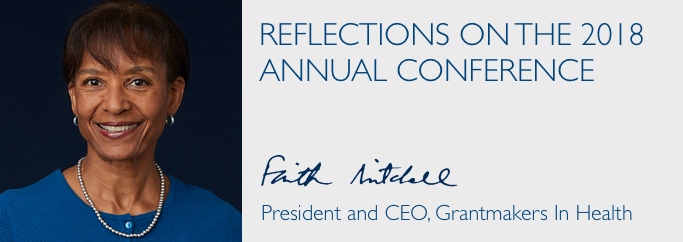
Health philanthropy is a complex, ever-evolving sector. New health foundations continue to emerge, bringing additional assets to communities across the country. Established health foundations continue to experiment, exploring new strategies to address the root causes of health problems, stimulate delivery system change, and build equitable working relationships with community partners.
To document some of the ways in which health philanthropy is evolving, I shared a snapshot of emerging program trends in my remarks at this year’s annual conference. We also selected plenary speakers whose work points the way to new approaches and perspectives. A common theme for all of them was how health is integral to every aspect of human experience.
Our Wednesday keynoter, Candice Jones, leads the Public Welfare Foundation, and is not technically a health funder. Public Welfare’s core programs are criminal justice, youth justice, and workers’ rights, but, as Candice made clear, the foundation’s grantmaking clearly recognizes the importance of health. In particular, the Public Welfare’s new initiative on race, redemption, and restoration explores the link between health and justice, including the effects of the justice system on physical and behavioral health, adverse childhood experiences (ACEs), and access to housing and health care.
Another keynote speaker, Vivek Murthy, is on a mission that grows out of his experiences as U.S. Surgeon General from 2014 to 2017, when he became aware of the degree of emotional pain experienced by the people he met in his travels. For Vivek, emotional well-being is not just the absence of mental illness; it is also having positive emotions that provide resilience in the face of adversity. As he observed in his dialogue with Tyler Norris, Chief Executive of the Well Being Trust, emotional well-being connects to everything we care about, and protects people from personally and socially harmful behaviors. Encouraging evidence indicates that interventions based on emotional well-being concepts can be effective in reducing the personal, familial, social and economic costs of mental illness and substance misuse.
Laura Mosqueda, Dean of the Keck School of Medicine at the University of Southern California, looks at health across the life course, especially as it relates to disability and aging, homelessness, and trauma (including ACEs, intimate partner violence, and elder abuse). Using disability as an example, Laura illustrated how its health effects differ across the life span. Similarly, homelessness and trauma affect health in lasting ways. She encouraged funders to partner with grantees and to understand that innovation is “not always about creating new models; sometimes it is about better integrating and coordinating existing models.”
The speeches by Terrence Keenan Awardee Michael Brown, Vice President of Community Programs at the Seattle Foundation, and Andy Hyman Awardee Elisabeth Arenales, Director of the Health Care Program at the Colorado Center on Law and Policy, echoed the urgency and energy of the other keynote speakers. “The time for designing new systems to achieve equity is now,” Michael urged. And Elisabeth, who closed the conference, observed, “There’s so much work to do!…We build on each other’s work [and] foundation support is crucial.”
On our website and app, conference registrants can revisit the new pathways described by these speakers, review my slides about established and emerging trends, and find resources from the breakout sessions and other annual conference activities. Podcasts of the keynote and award speeches have recently been posted to this website.

